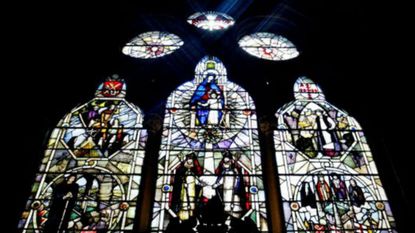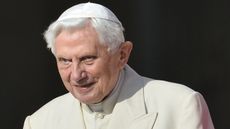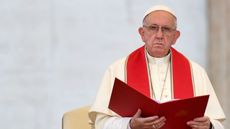Atheists now outnumber Christians in England and Wales
Study shows proportion of people who say they have 'no religion' has almost doubled since 2011

The number of people who class themselves as having no religion now significantly outweighs the Christian population in England and Wales, according to new research.
Analysis of data collected through British Social Attitudes surveys over three decades shows the proportion of the population who identify as having no religion reached 48.5 per cent in 2014 – almost double the number given on the 2011 census, reports The Guardian. Those who define themselves as Christian made up 43.8 per cent of the population.
Report author Stephen Bullivant, a senior lecturer in theology and ethics at St Mary's University in Twickenham, told the newspaper there was a "clear sense of the growth of 'no religion' as a proportion of the population".
Subscribe to The Week
Escape your echo chamber. Get the facts behind the news, plus analysis from multiple perspectives.

Sign up for The Week's Free Newsletters
From our morning news briefing to a weekly Good News Newsletter, get the best of The Week delivered directly to your inbox.
From our morning news briefing to a weekly Good News Newsletter, get the best of The Week delivered directly to your inbox.
He added: "The main driver is people who were brought up with some religion now saying they have no religion.
"What we're seeing is an acceleration in the numbers of people not only not practising their faith on a regular basis, but not even ticking the box.
"The reason for that is the big question in the sociology of religion".
His research also shows that the Church of England loses 12 followers for every person it recruits, while the Catholic Church loses ten. The vast majority of new recruits come from other denominations rather than non-Christians, says the study.
"There's a kind of denominational musical chairs," said Bullivant. "No one is making serious inroads into the non-Christian population."
Wales was the most godless area, with 59.5 per cent of the population saying they have no religion, while in London, the number was just 40 per cent, "but this is down to large numbers of Muslims, Hindus and Jews", says The Sun.
The study is unlikely to come as a surprise to faith leaders in England and Wales, says the Guardian. This year, the Church of England said it expected attendance to continue to fall for another 30 years as its congregation ages and younger generations spurn the institutions of faith.
Create an account with the same email registered to your subscription to unlock access.
Sign up for Today's Best Articles in your inbox
A free daily email with the biggest news stories of the day – and the best features from TheWeek.com
-
 Nuclear near-misses
Nuclear near-missesThe Explainer From technical glitches to fateful split-second decisions, the world has come to the brink of nuclear war more times than you might think
By Rebecca Messina, The Week UK Published
-
 What is cloud seeding and did it cause Dubai's severe rainfall?
What is cloud seeding and did it cause Dubai's severe rainfall?The Explainer The future is flooded
By Devika Rao, The Week US Published
-
 American Airlines pilots are warning of a 'significant spike' in safety issues
American Airlines pilots are warning of a 'significant spike' in safety issuesIn the Spotlight The pilot's union listed 'problematic trends' they say are affecting the airline's fleet
By Justin Klawans, The Week US Published
-
 Sexual abuse and ‘cruel indifference’: the disgrace of the French Catholic Church
Sexual abuse and ‘cruel indifference’: the disgrace of the French Catholic ChurchSpeed Read Landmark report estimates around 330,000 children were abused by clergymen and officials between 1950 and 2020
By The Week Staff Published
-
 French academics clash with minister over ‘Islamo-leftism’ inquiry
French academics clash with minister over ‘Islamo-leftism’ inquirySpeed Read Row over allegations of extremism in universities stokes growing culture war
By Chas Newkey-Burden Last updated
-
 Former Jehovah’s Witnesses sue over historic sex abuse
Former Jehovah’s Witnesses sue over historic sex abuseSpeed Read Group’s controversial ‘two witnesses’ policy has come under fire
By The Week Staff Last updated
-
 Retired Pope Benedict warns against relaxing celibacy rules
Retired Pope Benedict warns against relaxing celibacy rulesSpeed Read Benedict says he ‘cannot keep silent’ on the issue in new book
By The Week Staff Last updated
-
 Pontiff passion killer: why Italians have less sex when the Pope’s in town
Pontiff passion killer: why Italians have less sex when the Pope’s in townSpeed Read New study reveals drop in unintended pregnancies following papal visits
By The Week Staff Last updated
-
 Pope Francis lifts ‘pontifical secret’ rule in abuse cases
Pope Francis lifts ‘pontifical secret’ rule in abuse casesSpeed Read Sex abuse cases will no longer be held in secret as Church wrestles with the issue
By The Week Staff Last updated
-
 Catholic Church to consider ordaining married men
Catholic Church to consider ordaining married menSpeed Read Ending centuries of orthodoxy, radical plan aimed to address clergy shortage could lead to conservative backlash
By The Week Staff Last updated
-
 Pope Francis to force clergy to report sex abuse
Pope Francis to force clergy to report sex abuseSpeed Read New law will make it compulsory for all Catholic priests and nuns to report abuse and cover-ups by superiors
By The Week Staff Last updated